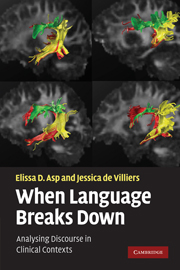Book contents
- Frontmatter
- Contents
- List of figures
- List of tables
- Acknowledgements
- Transcription conventions
- Introduction
- 1 Introduction to clinical discourse analysis
- 2 Theoretical and clinical contexts
- 3 Talk and speech – conversation analysis and intonation in English
- 4 Grammar
- 5 Phase and contexts of culture and situation
- 6 Study design
- 7 Differential diagnosis and monitoring
- 8 Cognitive models, inferencing and affect
- 9 Modelling information across domains
- Closing remarks
- Notes
- Appendix A Some basic grammatical terminology and relations
- Appendix B Inventory of codes
- References
- Author index
- Subject index
4 - Grammar
Published online by Cambridge University Press: 05 June 2012
- Frontmatter
- Contents
- List of figures
- List of tables
- Acknowledgements
- Transcription conventions
- Introduction
- 1 Introduction to clinical discourse analysis
- 2 Theoretical and clinical contexts
- 3 Talk and speech – conversation analysis and intonation in English
- 4 Grammar
- 5 Phase and contexts of culture and situation
- 6 Study design
- 7 Differential diagnosis and monitoring
- 8 Cognitive models, inferencing and affect
- 9 Modelling information across domains
- Closing remarks
- Notes
- Appendix A Some basic grammatical terminology and relations
- Appendix B Inventory of codes
- References
- Author index
- Subject index
Summary
Introduction
In this chapter, we outline in sequence a grammar for specifying interactional, ideational and organizational features of discourse in English. We use a functional organization for the grammar because we find this perspicuous for discourse analysis. The grammar owes much to Michael Gregory (2009a; 2009b). However, in many cases our approach is once again hybrid; we present a model that draws on social and cognitive perspectives on language, based on our experience of what works. Section 4.1 presents a grammar of interaction. In Section 4.2 we outline the grammar of ideation and Section 4.3 presents the grammar of organization. We presuppose that readers have a basic syntax for English. As much as possible, technical and model-specific terms are limited. Appendix A presents basic grammatical terminology and Appendix B lists the coding options suggested in this chapter.
A grammar of interaction
The interaction relationship has to do, initially, with two types of activity speakers can engage in. The first involves the negotiation of role relationships relative to an addressee and the second involves speakers' expressions of attitude and evaluations. Role relationships are most easily understood in institutional settings with highly generic situation types such as the classroom, court room or clinic, where boundaries may seem relatively fixed: teacher/ student, judge/defendant, doctor/patient, nurse/patient are examples of such role relationships (Goffman 1959; 1961). Less obviously hierarchic and institutionally dependent are peer relationships among colleagues, friends, siblings and partners.
- Type
- Chapter
- Information
- When Language Breaks DownAnalysing Discourse in Clinical Contexts, pp. 44 - 84Publisher: Cambridge University PressPrint publication year: 2010

